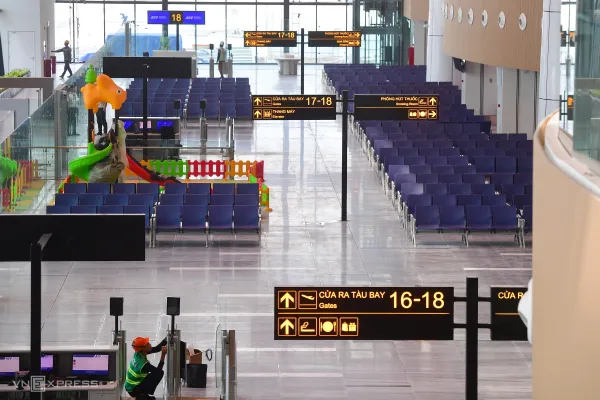The terminal is seen from above on Wednesday, one day before serving its first commercial flight that took off for Van Don Airport in the northern Quang Ninh Province, home to Ha Long Bay.
The project has completed most of its major components after nearly two years of construction. and is set for full operation on April 30two months ahead of schedule.
T3 will have an annual capacity of 20 million passengers, making it the largest domestic terminal in Vietnam.
Built by the Airports Corporation of Vietnam, work on the VND11 trillion (US$445 million) terminal began at the end of 2022.
The terminal has five floors and a total floor area of 112,500 square meters.
It has four main sections: the passenger terminal, a multi-story car park integrated with non-aviation services, an overpass, and an aircraft parking area.
T3 is located next to T1 domestic terminal, with its entrance facing the road connecting Tran Quoc Hoan and Cong Hoa streets.
It features a softly curved roof that extends from the terminal to the garden at the center of a commercial-office complex, evoking the shape of ao dai (traditional Vietnamese costume).
The terminal will handle domestic flights for Vietnam Airlines and Vietjet Air, while Bamboo Airways, Vietravel Airlines, Pacific Airlines, and VASCO will continue to operate from T1.
The top floor houses an airport check-in area, which is now nearly complete.
Its investor is currently working on the ceiling, installing glass walls, and laying stone floors.
Check-in counters are also installed with machines and behind them is a bagdrop system for luggage drop-off.
It has 90 traditional check-in counters, 20 automatic baggage drop counters, and 42 check-in kiosks.
The terminal features 25 security control gates and automatic conveyor belts, helping to save time for passengers.
The terminal features 27 gates, 13 of which are equipped with telescopic bridges, while the remaining 14 are served by buses.
The ground floor houses the baggage claim area, with the ceiling, tiles, signs, and conveyor belts nearly finished.
The lighting system has been completed.
Tan Son Nhat Airport earlier had two terminals, T1 for domestic flights and T2 for international flights, with an initial design capacity of 28-30 million passengers per year.
However, the number of passengers passing through has exceeded 40 million per year, putting great pressure on the infrastructure.
When terminal T3 is put into operation, it will handle about 80% of domestic passengers, helping to reduce the load on terminal T1, which is seriously overloaded.
Inside the T3 T3 station is about to be completed. Video: Minh Trinh
Inside the T3 terminal at Tan Son Nhat Airport in HCMC. Video by Minh Trinh

